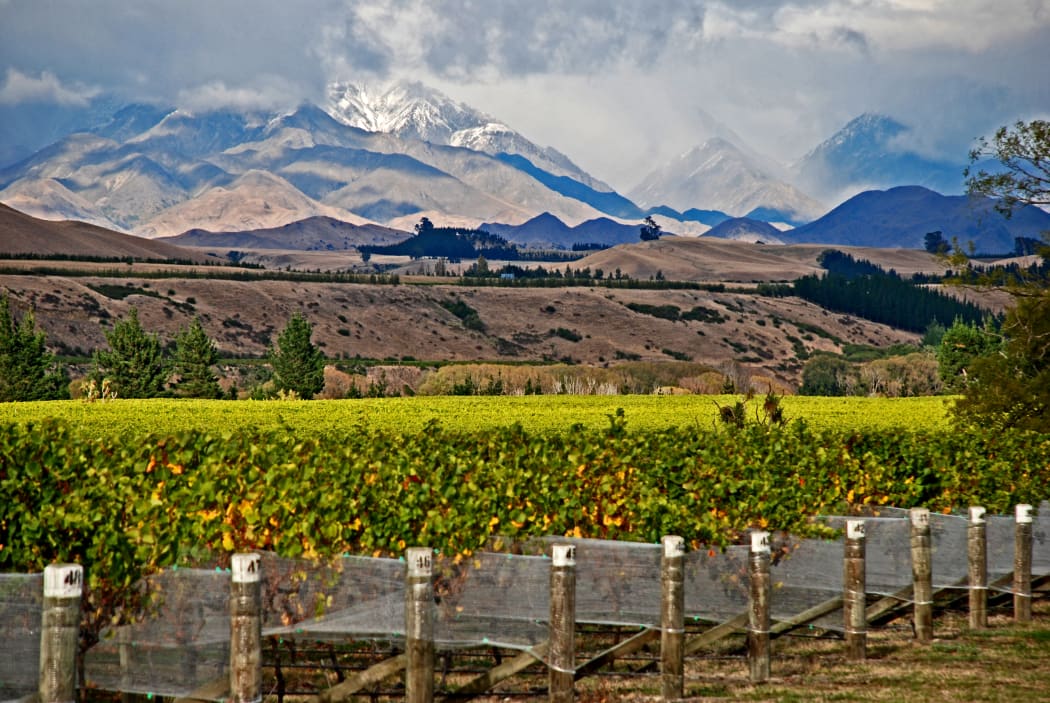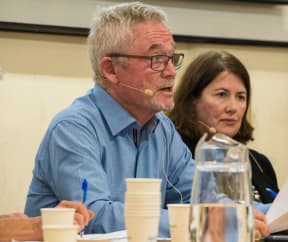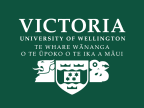
Autumn in the Awatere Valley Photo: Wikimedia Commons
Is terroir a terrible idea?
Terroir, appellation and geographical indicators are held up as the way for us to market high-quality wine. But is this true, what are the downsides for the wine industry?

Neil McCallum, Prof Susy Frankel Photo: Victoria University of Wellington. All rights reserved.
What the law has done to the word 'champagne' is a textbook example of why the appellation system is bad for consumers and producers, says Professor Susy Frankel, Chair in Intellectual Property and International Trade at Victoria University of Wellington.
Based on notions of terroir – that there is something indefinable, but clearly special, identifiable and worth protecting about the place where a particular wine is made – champagne was given trade protection decades ago, and other producers of the style around the world were banned from using the word.
Here in New Zealand in the mid-'80s, our Court of Appeal confirmed that it could be used only by French wineries in the Champagne region.
“Why?” she asks.
“Because the reputation of the champagne style should not be sullied by Australian imitators. Having Australian champagne here would be a disaster.”
She considers this judgement to be clearly complete nonsense. At the time, the only injured party was the New Zealand consumer, who had to pay more for sparkling wine because we wouldn’t allow the cheap import in.
This application of the law is bad, she considers, because it keeps prices artificially inflated, presupposes ignorant consumers who have to be protected from the consequences of their decisions, and dampens innovation. It also freezes the notion of place and culture in time.
In the case of champagne, Prof Frankel argues, it confers an extraordinary advantage on the industrial-sized manufacturers who benefited greatly from the control of the supply.
She’s also somewhat sceptical about the claims for terroir.
While we may think of champagne being produced in charming little wineries, and stored in picturesque underground cellars, in reality, the processes are industrial, the images prosaic, and, she suggests, the connection with the terroir weakened.

Historical and contemporary wine production Photo: Wikimedia Commons
What’s even worse, according to Prof. Frankel, is that the notion of terroir has spread beyond wine to cheese such as feta and fabrics like Harris tweed.
In parallel to the French appellation system, geographical indications for food and other products now have the force of law, preventing the use of commonly-accepted words by anyone other than a minority of privileged producers who happen to live in the place where production first began.
She pours scorn on this system, noting that there are many areas of France where producers outside the favoured geographical area object to it as they consider it’s inhibited innovation. “Appellation systems benefit some, but not all.”
Predicting that the EU wants to extend these protections further in its trade agreements, she adds “It’s managed to get a large number of Pacific islands to suck up this nonsense in exchange for getting aid.”
She foresees problems in any wholesale adoption here of the EU geographical indications model, or the USA’s parallel concern for trademarks as neither of these discussions actually answer the question ‘what would really make the New Zealand industry flourish?’
Her conclusion is that we risk, as a result, not being able to make our own decisions about how we use the law to support the wine export industry.
For winemaker Neil McCallum and wine writer John Saker, these concerns are outweighed by the benefits of the appellation system, and the nudge it gives to New Zealand winemakers to focus on producing high-quality wines which sell at a good price in this country and internationally.
That, they concur, is the future of a sustainable wine industry in this country.

The Butcher Shop - a series of discussions about the place of primary production in our history and culture - is created by Victoria University of Wellington under its Enriching National Culture theme.

